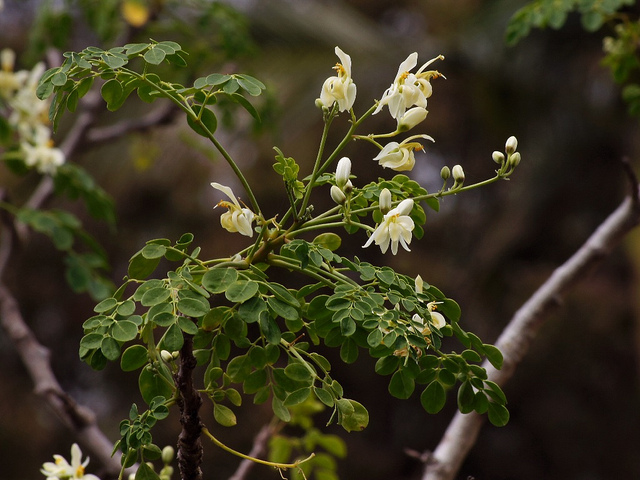 By introducing and cultivating the fast-growing drought tolerant moringa tree in villages in rural Kenya, the Green World Campaign (GWC) is helping villagers reverse deforestation, improve soil fertility, and increase their food security.
By introducing and cultivating the fast-growing drought tolerant moringa tree in villages in rural Kenya, the Green World Campaign (GWC) is helping villagers reverse deforestation, improve soil fertility, and increase their food security.
Between deforestation and short-term farming tactics that don’t replenish soil nutrients, farmland in Kenya has been severely depleted, and when combined with drought events in recent years, smallholder farmer yields have stagnated. This perfect storm of environmental and agricultural degradation in rural Kenya has been taking a toll on villagers in the form of poverty, food insecurity, and malnutrition in these already fragile areas.
But a recent initiative by GWC, as a part of their ReGreen the World campaign, might have a solution for increasing not only food security and nutrition in rural Kenya, but also improving the soil fertility, reforesting degraded land, and even providing an income for smallholders.
The moringa oleifera tree is a fast growing (reaching maturity in just 9 months) and drought-tolerant tree that has both edible leaves and oil-bearing seeds, and GWC believes that by cultivating moringa trees, communities can be revived and their rural livelihoods restored to them. According to Marc Barasch, the founder and director of GWC, Kenyan households can save up to 25% of their budget through pressing their own oil from the moringa tree seeds, and because the moringa leaves are 30% high quality protein and have high levels of nutrients, cultivating moringa trees can ensure that families can avoid starvation and increase their nutrition.
According to GWC, moringa tree leaves have 25 times the iron of spinach, 17 times the calcium of milk, 15 times the potassium in bananas, and 9 times the protein of yogurt, and villagers can not only eat them for their own meals, but can also sell them as a food item to others. It’s said that one single moringa tree can easily feed a family of 7 once a week, so a plantation of many moringa trees could make a huge difference in the lives of rural villagers.
By using a small oil press, villagers can produce their own oil from the seeds of the moringa trees, and use that oil for cooking (or to sell), for body and hair use, and the left over seed cake can be used as a livestock feed.
“The recent introduction of a seed-oil press by Green World Campaign is magnifying the benefits of moringa beyond nutrition and environmental restoration by providing an alternative to expensive purchased oil. Kunyeta is one of 6 women who have used oil from the new press, which has the potential to meet virtually all their oil usage needs including cooking; baby oil; body oil for messaging tired muscles following hard farm labor, protecting skin from the sun and heat, and as a beauty product. Women across Kenya often cover themselves from head to toe each day with oil, and the women have noted superior results from moringa’s extraordinary nutrient profile and deep penetrating ability. The oil, with its rich antioxidants, is also remarkably stable—it typically has a 5-year shelf-life.” – GWC
Currently, GWC is working with a small number of farmers groups, but they believe that the benefits of oil production could be easily be scaled up throughout the region to be able to provide food, oil, and even income to more communities. According to an email from Marc Barasch, the Kenyan Red Cross wants to partner with GWC in 50 locations, if they had the resources, and farmers all along the Kenyan Coast “are clamoring for us to start up integrated moringa projects in their areas.”
If you’re interested in helping to plant trees through the Green World Campaign, you can do so at their website, or if you’re interested in funding one of the moringa tree pilot projects, contact them at [email protected].
http://www.youtube.com/watch?v=CoPzQCacDkE
Funded almost entirely by small online donations, in 2013, GWC has been able to:
- sustain 85 Green World Schools programs in Kenya, where kids plant and care for up to 2000 trees per school while learning about ecology and global citizenship
- plant over 15,000 drought-tolerant, soil-restoring moringa trees, whose seeds are pressed by local women into healthy cooking and body oil, and whose high-protein leaves are a bulwark against famine;
- create a youth-driven Trees for Peace campaign in Kenya to help resolve inter-tribal conflict
- help restore Kenya’s Pungu Watershed, once home to sacred forest groves and magnificent wildlife
[Image: Tatters]


Kuli Kuli Bar based in Oakland produces snack bars made from Moringa for an amazing nutritious bite to eat. Check out their website, kulikulibar.com for more info on it